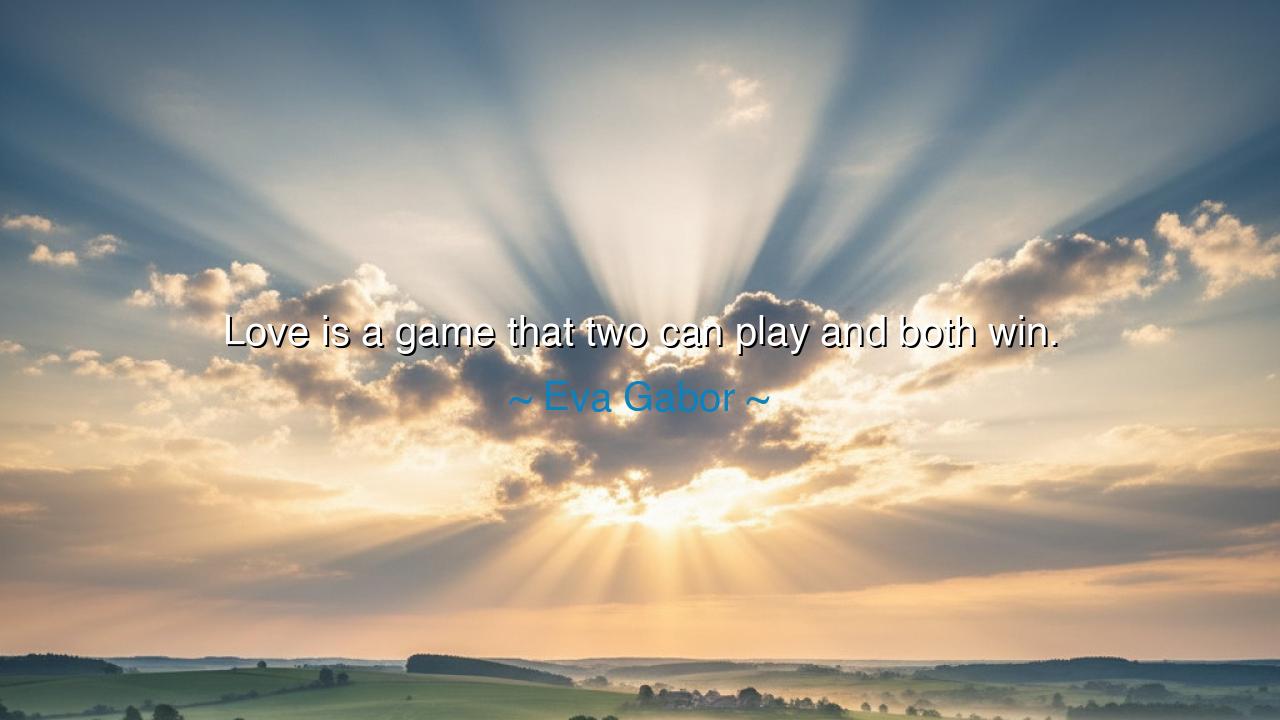
Love is a game that two can play and both win.






Eva Gabor, in her profound simplicity, tells us: “Love is a game that two can play and both win.” These words reveal a truth about love that transcends the conventional wisdom of romantic competition and selfish gain. In the traditional view, love is often seen as a battle—one in which there is a winner and a loser, where hearts are torn, and one side must suffer for the other to thrive. But Gabor’s wisdom invites us to see love as something entirely different—a collaborative game, a shared journey where both participants can emerge victorious. In this sense, love is not a contest, but a partnership in which both parties find fulfillment, joy, and growth through the mutual exchange of care, respect, and affection.
The ancients too, understood the nature of love as a partnership, though they often used different language. Aristotle, in his writings on friendship, described the ideal relationship as one in which both parties benefit, where virtue is shared and growth is mutual. For Aristotle, love and friendship were not about possession or control, but about sharing common goods—whether those goods be moral, intellectual, or emotional. The highest form of love, he said, was one where both parties brought out the best in each other, where love led to mutual flourishing rather than self-centered gain. Gabor’s quote echoes this ancient wisdom—love is not about keeping score, but about both individuals winning together, sharing in each other’s happiness and success.
The story of Heloise and Abelard serves as a tragic counterexample to this idea of love as a collaborative game. Their love was one of the greatest stories of passion, but also of tremendous sacrifice. Abelard, a philosopher, and Heloise, his brilliant pupil, fell deeply in love, but their love was marred by the imbalance of power and the sacrifices they were forced to make. Their union was not a partnership in the true sense, as it was fraught with obstacles that led to Abelard’s emasculation and their eventual separation. This tragic tale highlights how love, when seen as a competition or one-sided, can leave both partners in pain and regret. In contrast, the love that Gabor speaks of—a game in which both win—was absent from their lives. Their love was one of imbalance rather than shared victory.
In contrast, we look to the life of Antony and Cleopatra, whose relationship, though fraught with political intrigue, served as a powerful example of mutual gain. While they ruled together, their love was not just political but emotional, intellectual, and physical. Cleopatra, a queen of great intelligence, and Mark Antony, a Roman general of immense stature, both found in each other the kind of partnership that enabled them to win both personal and political victories. Though their story is also marked by tragedy and loss, their love can be seen as a testament to what it means to have a partnership where both individuals thrive. In their union, love became a force that elevated them both to greater heights.
Gabor’s quote speaks to a deeper truth—that love, when it is truly shared, has the capacity to elevate both partners, to foster an environment where each can grow and flourish without feeling diminished or compromised. True love is not about competition or about one person always giving while the other always takes. It is about balance and reciprocity, where both individuals contribute equally and, in turn, receive equally. True love is a partnership, not a transaction. It is a game, as Gabor puts it, where both participants benefit, where both grow, and where both win. It is the kind of love that nourishes and uplifts, a love that strengthens the hearts and minds of those involved.
So, O children of the future, let this be your guiding wisdom: in your relationships, strive to make love a partnership rather than a contest. See love not as something to possess or control, but as a shared journey, where both individuals grow stronger, happier, and more fulfilled. In all your relationships, whether with friends, family, or lovers, remember that love is not about domination or sacrifice, but about collaboration, balance, and mutual empowerment. Give love freely, without the expectation of taking something in return, and you will find that in doing so, you create a space where both you and your partner can win—in joy, in peace, and in the shared victory of a love that grows and flourishes with time.
And so, remember: in love, as in the most noble of games, both can win—when love is shared, when it is given and received equally, when it is a partnership that elevates both hearts. Love is a force of mutual growth, a source of joy and fulfillment that transcends mere desire. Let your love be a game that both of you can play, and in doing so, you will find that it is the most rewarding game of all.






AAdministratorAdministrator
Welcome, honored guests. Please leave a comment, we will respond soon